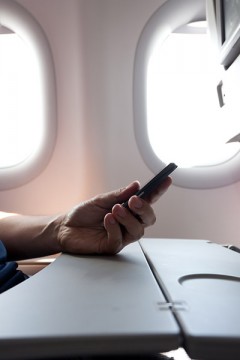
Kazuhiro Tanda / The Image Bank / Getty Images
“At this time, please turn off all portable electronic devices” has become a phrase loathed by airplane passengers, but in time, it may become a thing of the past.
The Federal Aviation Administration is looking at ways to update its policy on the use of portable electronics during takeoff and landing, the New York Times reports. Cell phones are still off the table, but the FAA at least seems interested in letting people use e-readers and tablets throughout the flight.
(MORE: Why I Won’t Turn Off My Gadgets on Planes)
“With the advent of new and evolving electronic technology, and because the airlines have not conducted the testing necessary to approve the use of new devices, the FAA is taking a fresh look at the use of personal electronic devices, other than cellphones, on aircraft,” FAA spokeswoman Laura Brown told the Times.
That doesn’t mean you’ll be able to keep your iPad switched on during your next flight, or any flight in the foreseeable future. There’s still a lot of work to be done, and unanswered questions about the FAA’s current regulations will change.
Under the current rules, airlines can clear individual portable electronics for use during takeoff and landing, but to do so, they must test every device — including different versions of the same tablet or e-reader — on every plane model, with no passengers on the plane. Testing one brand of gadget alone would be time consuming and expensive, let alone every e-reader, tablet and laptop in existence, so airlines have stuck with the status quo.
Now, the FAA is rethinking this approach, and wants to bring together device makers, consumer electronics groups, avionics manufacturers, airlines, pilots, flight attendants and passengers to figure out a solution.
Still, it’s not clear how much the FAA is willing to relax its testing requirements. The Times believes that massive testing will be required, and that’s going to take time and money. Electronics makers could come together to foot the bill, but it’s not a given that they well.
That brings up another issue: If individual electronic devices must be tested, what happens if some device makers don’t get on board? Are flight attendants going to start checking the backsides of nearly indistinguishable tablets to make sure they say “Samsung” or have the Apple logo? Without a blanket policy that covers entire categories of electronics, airlines won’t be able to enforce rules consistently.
For now, I’m not getting my hopes up, but I appreciate that the Times‘ Nick Bilton has been hounding the FAA on the issue. With little evidence that offline gadgets cause electrical interference during flights, a change in policy is overdue.
MORE: iPads in the Cockpit, But Not in the Cabin? The In-Flight Gadget Controversy Continues

